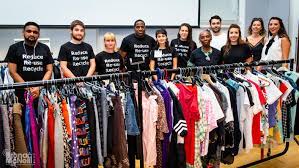Fashion has always been an evolving form of self-expression, with trends shifting and styles changing over time. In recent years, a fascinating phenomenon has emerged in the fashion world—Fashion Exchange. This innovative concept goes beyond the traditional retail experience, offering a platform for fashion enthusiasts to exchange clothing and accessories. In this article, we’ll explore the evolution of fashion exchange, its impact on sustainable fashion, the challenges it faces, and the exciting future prospects it holds.
Evolution of Fashion Exchange
Historical Background
Fashion has roots tracing back to community-based clothing swaps where individuals would gather to trade items. However, the digital era has significantly transformed this concept, making it accessible to a global audience. The convenience of online platforms has revolutionized the way people engage in exchanging fashion items.
Technological Advancements’ Impact
The rise of advanced technologies, such as artificial intelligence and blockchain, has played a crucial role in shaping the fashion exchange landscape. These technologies enhance authentication processes, ensuring the credibility of exchanged items and building trust among users.
Key Players in Fashion Exchange
Overview of Major Platforms
Several platforms have emerged as leaders in the fashion space. Platforms like SwapStyle, Poshmark, and Depop provide users with the opportunity to buy, sell, and exchange pre-loved fashion items. Each platform has its unique features, catering to different preferences and styles.
Unique Features and Services Offered
These fashion platforms often offer features like virtual try-ons, personalized recommendations, and secure transaction methods. Some platforms even integrate social elements, allowing users to connect with fellow fashion enthusiasts and share their experiences.
Benefits for Fashion Enthusiasts
Access to Diverse Styles
Fashion exchange opens doors to a diverse range of styles, allowing individuals to explore fashion beyond what traditional retail offers. This diversity promotes a more inclusive and expressive approach to personal style.
Cost-Effectiveness and Sustainability
One of the significant advantages of fashion is its cost-effectiveness. Participants can refresh their wardrobes without breaking the bank, contributing to a more sustainable approach to fashion consumption by reducing waste.
Impact on Sustainable Fashion
Reducing Environmental Footprint
Fashion exchange aligns with the principles of sustainable fashion by extending the lifecycle of clothing items. This helps reduce the environmental impact associated with the production and disposal of clothing.
Encouraging Circular Fashion Economy
The concept of circular fashion economy thrives on the idea of reusing and recycling fashion items. Fashion actively contributes to building a circular economy within the fashion industry, promoting a more responsible and eco-friendly approach.
Challenges and Solutions
Trust and Authentication Issues
Despite the benefits, trust and authentication remain concerns in the fashion community. Platforms are continually developing robust authentication measures, including blockchain technology, to address these challenges and ensure the reliability of exchanged items.
Implementing Secure Transaction Methods
Securing transactions is a priority in fashion . Platforms are implementing secure payment gateways and escrow services to guarantee a safe and reliable exchange process, fostering trust among users.
Community Building in Fashion Exchange
Connecting Fashion Enthusiasts
Fashion extends beyond mere transactions; it’s about building a community. Users connect with like-minded individuals, sharing their passion for fashion and creating a supportive network.
Sharing Experiences and Styling Tips
The community aspect encourages participants to share their fashion experiences and styling tips. This collaborative environment adds a personal touch to the fashion exchange, making it a more engaging and enjoyable experience.
Fashion and Global Trends
Influence on Fashion Trends Worldwide
Fashion is not limited by geographical boundaries. It has the power to influence and shape fashion trends globally, fostering a cross-cultural exchange of styles and ideas.
Cultural Exchange Through Fashion
As users from different parts of the world engage in fashion, cultural elements become intertwined. This cultural exchange adds depth and richness to the fashion landscape, celebrating diversity in style.
How to Get Started with Fashion
Creating a Profile
Getting started with fashion exchange is easy. Users can create a profile on their preferred platform, providing information about their style preferences and clothing sizes.
Listing and Exchanging Items
Once the profile is set up, users can start listing items they want to exchange. Clear and detailed descriptions, along with quality photos, enhance the chances of successful exchanges.
Fashion Exchange Etiquette
Guidelines for Respectful Exchanges
Observing etiquette is crucial in the fashion community. Users are encouraged to be transparent about the condition of their items, adhere to agreed-upon terms, and communicate openly for a positive exchange experience.
Ensuring Fair Transactions
Fairness is at the core of fashion. Participants are expected to exchange items of comparable value, ensuring that both parties benefit from the transaction.
Success Stories in Fashion
Profiles of Individuals Benefiting from Exchanges
Highlighting success stories adds a personal touch to the article. Sharing stories of individuals who transformed their wardrobes through fashion serves as inspiration for readers.
Inspiring Transformations Through Fashion
From budget-friendly wardrobe updates to discovering unique and rare pieces, success stories showcase the transformative power of fashion, encouraging more individuals to participate.
Future Prospects of Fashion Exchange
Potential Advancements
The future of fashion holds exciting possibilities. Advancements in technology may lead to more sophisticated platforms, offering enhanced features and


